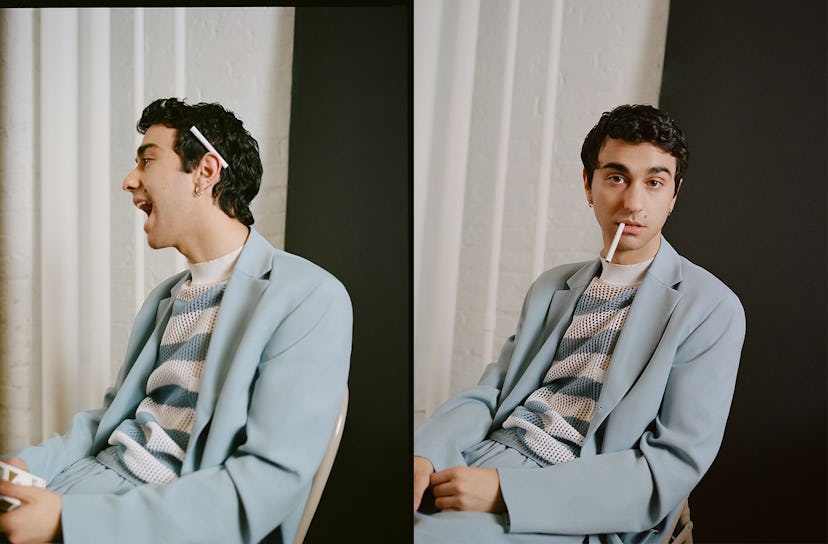If there was ever a horror movie to follow up on The Texas Chainsaw Massacre, which came to a legendary end when Sally, matted with dried blood and laughing in hysterics, sped away in the back of a pickup decades ago, it just might be Hereditary, which is finally out in theaters this Friday. It’s director Ari Aster’s first-ever feature film, but his debut has been hotly anticipated ever since it premiered at the Sundance Film Festival—prompting critics to describe it as “pure emotional terrorism” and scream just as loud as the characters.
No one needs less convincing of the film’s hype, though, than its starring cast members, who went through it all firsthand. Take it from the 20-year-old actor Alex Wolff, first spotted in the film’s trailer actually banging his head on a desk. When you take into consideration that he practically only ever shows up on screen sweating, distressed, or on the verge of tears, it’s no surprise that the actor barely emerged from the other end of production mentally intact.
“I think the process of [making] the movie was trying not to cry, because for anyone, if you open a valve, it’s hard to stop,” he told me on a recent afternoon during which, for the record, no tears were shed. Still, the film’s impact on Wolff was strikingly apparent for such a sunny setting, especially as it’s been months since he was in the thick of it. “I was getting sick, but I was getting sick off-camera, too. I would feel so sick in bed. I lost a ton of weight doing it because I was so upset,” he recalled between bites of a breakfast sandwich.
Hereditary, which Wolff considers more family drama than heart-pumping horror, burns slowly. Over the course of its two-hour run time, though, its stars, the Graham family, gradually unravel, starting with the death of its eerie matriarch—something her daughter Annie, played by Toni Collette, just can’t bring herself to accept. Her despair infects her relationships with her children and her work, as well as quickly dissolves her grasp on reality.
Meanwhile, as she navigates her grief, Wolff’s character, her son Peter, just wants to get on with life without shouldering the burden of anyone else’s problems—the main one being looking after his younger sister Charlie, played by the Broadway actress Milly Shapiro in a breakout on-screen role. Inevitably, though, another tragedy—this time, involving a gruesome accident with his sister—once again strikes, prompting a now completely distraught Annie to seek counsel from a new friend who can connect to spirits beyond the veil, which of course only makes things worse.
Alex Wolff wears a Dries Van Noten coat and trousers; Calvin 205W39NYC boots. Photo by Hans Neumann. Styled by Taylor McNeill. Grooming: Jerome Cultrera.
By the end, it’s the scariest movie since 2005’s The Descent; the New York Times just christened it the scariest movie of the summer—which, by the way, A24 has taken pains to scientifically prove, tracking how some viewers’ resting heart rates, which normally range from 60 to 100 beats per minute, spiked all the way up to 164 during screenings, even though they were sitting. Aster engineered all that by pushing them to their very edge—an approach that Wolff can only fully appreciate now that he’s come out on the other side.
Alex Wolff wears a Prada coat; Berlutti sweater and white pant. Photo by Hans Neumann. Styled by Taylor McNeill. Grooming: Jerome Cultrera.
Wolff’s career has been one of transformations; over the past decade, he’s gone from a Nickelodeon star and half of the Naked Brothers Band to the on-screen representatives of figures like the Boston bomber Dzhokhar Tsarnaev in 2016’s Patriots Day and a real-life serial killer’s close childhood friend in 2017’s My Friend Dahmer. Still, it was only when he finally saw the film when Wolff realized just how far he went to embody Peter: “To me, my eyes look different; my face looks different. I look in a way that I don’t really recognize,” he said. “And that was the main goal.” Aster was, of course, there to help: “I have tears in my eyes [throughout the film], but I like that Ari didn’t fully let me have a release or a crying scene where I feel better. He wanted me to not feel better. He wanted me to have doom,” Wolff continued. (To say that the director succeeded is an understatement; when the action comes to a head, it’s indescribably horrifying.)
Toni Collette in *Hereditary.*
Doing so, however, required Wolff to develop a few techniques of his own. “I really wanted to see how far I could take the physical aspects of it,” he said of a performance so intense and uncompromising that it could only be carried off with a steady diet of self-sabotage. “I had a bottle of balsamic vinegar in my trailer, and I drank four or five big gulps of it before a couple scenes, which is pretty upsetting for your stomach,” he said. He may have been nauseous, but holding it down did just the trick when it came to coming off as ill, moody, and disturbed.
You can definitely take Wolff’s word for it, then, that Hereditary is “totally that movie” that stays with you long after the credits roll. It certainly stayed with Wolff, who now seems primed to give Hollywood a heart attack: “I wanted to leave a little bit of my sanity on the floor there,” he said.
Alex Wolff wears a Dries Van Noten coat and trousers. Photo by Hans Neumann. Styled by Taylor McNeill. Grooming: Jerome Cultrera.
Related: Why Horror Movies Are the Most Exciting Art Form of the Trump Era
